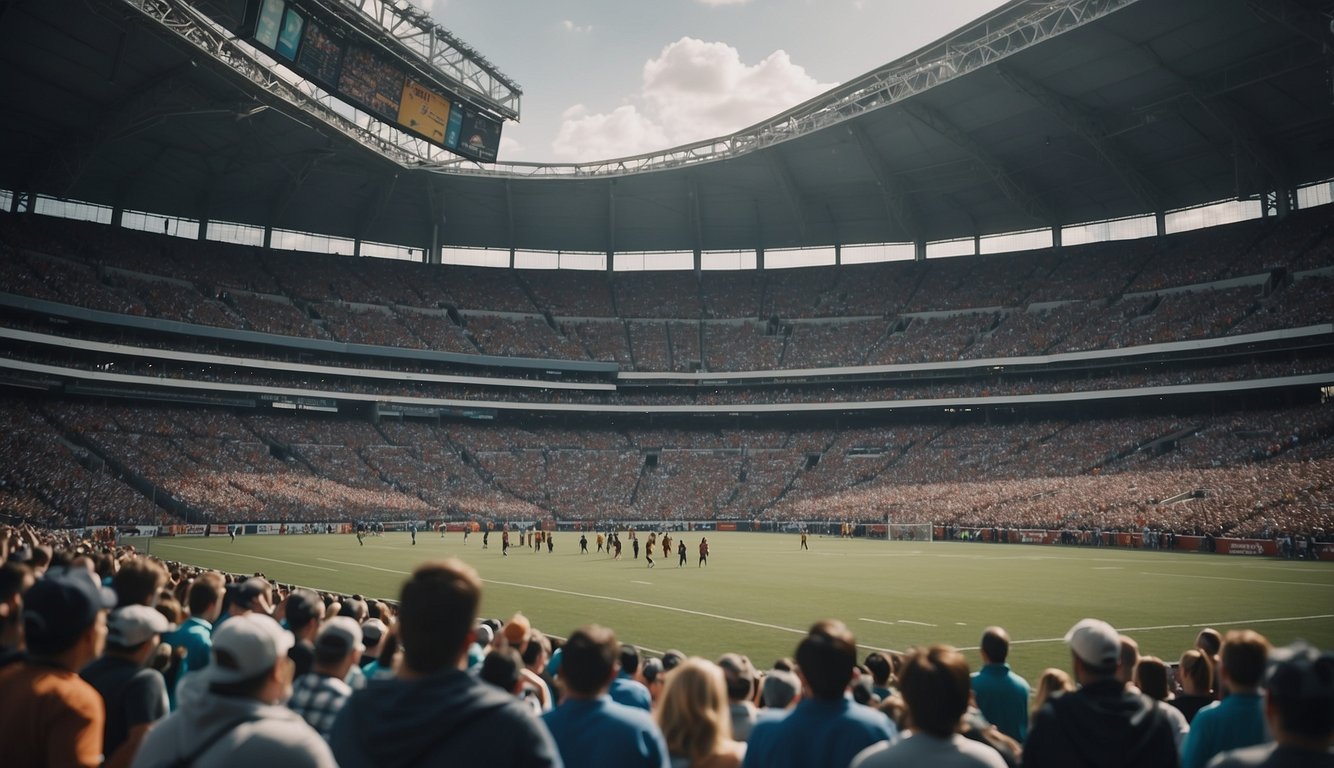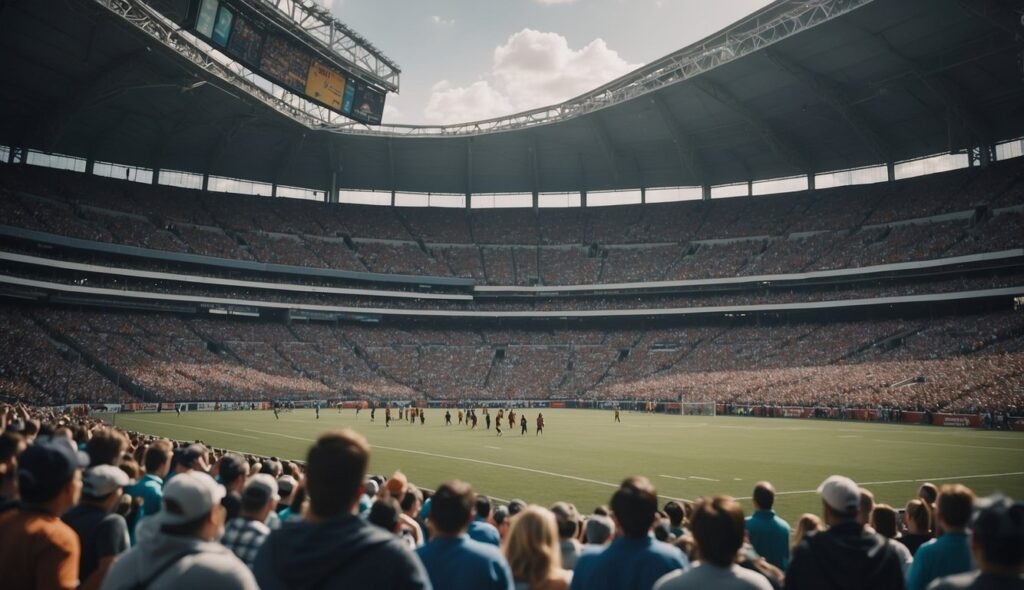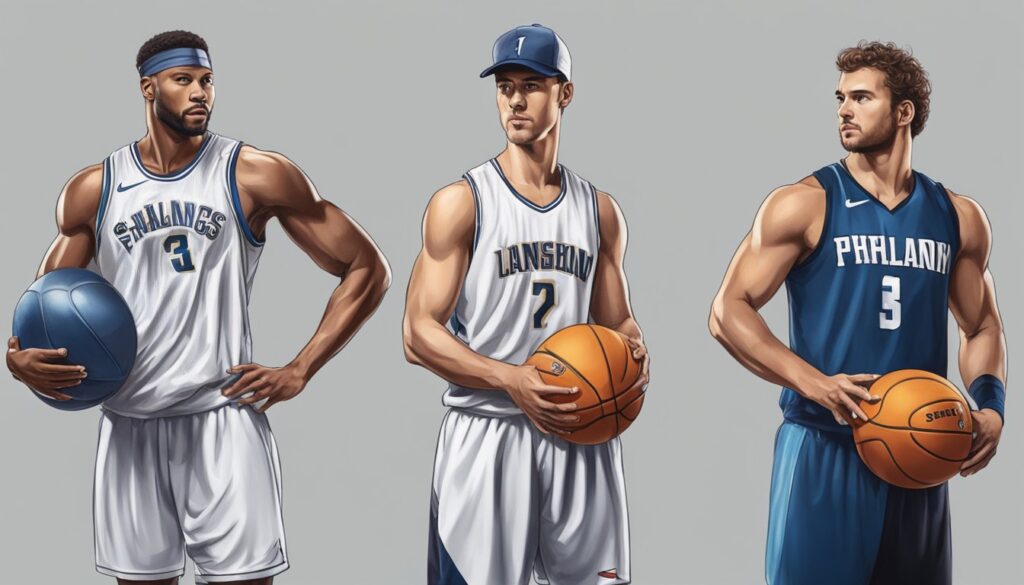100+ Sports Interview Questions: Expert Tips for Engaging Athletes

When stepping into the world of sports, whether as an aspiring athlete, a coach, or behind-the-scenes personnel, the ability to handle interview questions with poise is as crucial as the skills on the field.

Crafting thoughtful answers to job interview questions in sports isn’t solely about showcasing triumphs. It’s about articulating your approach to challenges, teamwork, and personal development within the competitive arena.
As you prepare, it’s important to consider the range of topics you might encounter, which can span from your specific contributions to a team’s dynamic to your long-term goals in sports.
The key lies in authenticity and preparedness when tackling sports interview questions. Whether the focus is on your career milestones or the nitty-gritty of game tactics, your responses should convey a clear narrative of your journey.
They should reflect a deep understanding of the sport, demonstrate unwavering dedication to growth and illustrate how you embody the values core to the team or organization you aim to join. This post covers 100+ Sports Interview Questions to ace your dream job.
Page Contents
Background Questions for Sports Interview
When starting a sports interview, it’s crucial to establish the interviewee’s background. This helps to understand the history and context within the sport. Below is a list of 10 background questions with sample answers:
- Q: What motivated you to pursue a career in sports?
A: My passion for the game and the thrill of competition have always driven me. Watching my role models excel inspired me to work hard and chase my dreams. - Q: How did you get started in your specific sport?
A: I began playing in local youth leagues, and my natural talent was recognized by my coaches, who encouraged me to take the sport more seriously. - Q: Can you share a pivotal moment in your early career that shaped your path?
A: Yes, making the game-winning shot at a high school championship game solidified my desire to play professionally. - Q: What sports did you play growing up?
A: I played soccer, basketball, and ran track, but soccer was where I truly excelled and decided to focus my energy. - Q: Who were your sports idols growing up, and how did they influence you?
A: I looked up to athletes like Michael Jordan and Sachin Tendulkar. Their work ethic and determination taught me the value of perseverance. - Q: What challenges have you faced on your way to becoming a professional athlete?
A: Injuries and setbacks were major challenges, but they taught me resilience and the importance of mental strength in overcoming obstacles. - Q: How did your family and friends support your sports aspirations?
A: My family was always there for me, attending games and providing emotional support. My friends pushed me to train harder and improve. - Q: What academic or training programs did you undertake to support your athletic development?
A: I attended a sports academy with a strong athletic program and studied sports science at college to better understand how to optimize my performance. - Q: How has your training regimen evolved from your amateur days to now?
A: My training has become more specialized and focused on fine-tuning my skills, with a greater emphasis on recovery and nutrition. - Q: What do you consider your greatest achievement outside of sports?
A: Earning my college degree while balancing a rigorous training schedule was a proud accomplishment that taught me time management and discipline.
Common Questions for Sports Interview
Q: What are your main aspirations in your sports career?
A: My aim is to reach the peak of my athletic capabilities and to inspire others with my dedication and achievements.
Q: How do you plan for your future in sports?
A: I set short-term and long-term goals, continually assess my progress, and adjust my training and strategy accordingly.
Q: Can you share your most immediate athletic goal?
A: Currently, my focus is to improve my personal best by 10% by the end of the season.
Q: What drives your motivation to succeed?
A: The desire to excel and the thrill of competition fuel my drive, along with the support of my team and loved ones.
Q: How do you define success in your sport?
A: For me, success is about consistent improvement, achieving my personal goals, and contributing positively to my team.
Q: What advice would you give to someone just starting in your sport?
A: Dedicate time to mastering the basics, seek constructive feedback, and remain patient as skills develop.
Q: What’s the most valuable lesson your sports career has taught you?
A: Resilience in the face of adversity and the importance of teamwork have been my greatest lessons.
Q: How do you recover from a setback or a poor performance?
A: I analyze what went wrong, learn from it, and focus on my training to come back stronger.
Q: What are the key qualities that help you succeed in your sport?
A: Discipline, perseverance, strategic thinking, and adaptability have been crucial for my success.
Q: How important is mental preparation compared to physical training?
A: Both are equally important; a strong mental game complements physical ability and is often the differentiator in high-pressure situations.
Sports Interview Skill Based Questions

In sports interviews, it’s crucial to inquire about specific abilities to gauge a prospect’s capabilities. This set of questions probes into an athlete’s technical skills, tactical understanding, and their application in real scenarios.
Q: How do you maintain your fitness level during the off-season? A: You should engage in a combination of cardiovascular training, strength workouts, and sport-specific drills to keep in peak physical condition year-round.
Q: Can you describe the technique behind your serve in tennis? A: You should outline your stance, grip, ball toss, and follow-through, highlighting the precise motions that contribute to an effective serve.
Q: How has your dribbling technique improved over the past season? A: You could discuss specific exercises you’ve practiced, such as cone drills or one-on-one plays, to enhance your ball-handling skills.
Q: What strategies do you use to keep your focus during high-pressure situations? A: You should mention mental preparation practices, such as visualization or deep-breathing techniques that help you remain calm and focused.
Q: Describe a time when you had to quickly adapt your strategy during a game. A: You would provide an example of an in-game situation that required a tactical adjustment, explaining your thought process and the outcome.
Q: How do you take advantage of your strengths in a match? A: You might talk about positioning yourself in scenarios that play to your strong suits or employing skills like speed or precision where they’re most effective.
Q: How do you work on your weaker areas? A: You should detail specific training methods or drills you use regularly to improve aspects of your game that are less dominant.
Q: How do you communicate with your team on the field? A: You would discuss the verbal and non-verbal cues you use for effective collaboration and strategizing with teammates during play.
Q: Can you walk us through your thought process when reading the game? A: You should explain how you assess the game’s flow, the opponents’ formation, and your teammates’ positioning to anticipate and react to play developments.
Q: What techniques do you use to ensure you’re making accurate shots or passes? A: You might share your approach to training, such as target practice, pressure simulations, or working with a coach to refine your technique.
List of 100 Questions for Sports Interview

When preparing for a sports interview, you want to ensure your questions cover an athlete’s personal experiences, training regimen, challenges, and perspectives on their sport. Here is a curated list of 100 questions that you can use to gain a deep and comprehensive understanding of an athlete’s world.
- What inspired you to start playing your sport?
- How do you set your goals?
- Can you walk through your typical training day?
- How important is diet in your overall training regimen?
- How do you handle pressure during big competitions?
- What was your most memorable match and why?
- How do you recover from a defeat?
- What role do coaches play in your development?
- How do you stay motivated during the off-season?
- What’s your technique for staying focused during a game/match?
- Can you describe your warm-up routine?
- How do you mentally prepare before a game?
- What exercises are key to your fitness?
- How do you maintain peak physical condition?
- Do you have a pre-game ritual or superstition?
- How do you build chemistry with your teammates?
- What qualities make a good team captain?
- How do you resolve conflicts within the team?
- What does teamwork mean to you?
- How does the team’s strategy evolve over a season?
- What’s the most important skill in your sport?
- How do you measure your performance?
- Do you use technology to enhance your training?
- How do you develop your strengths and work on your weaknesses?
- What’s your strategy for improving your technique?
- How do you prevent injuries during training?
- What’s your approach to injury rehabilitation?
- How have you adapted your play style to avoid further injuries?
- How does an injury affect your mental state?
- Can you share an experience of overcoming a serious injury?
- What has been the highlight of your career so far?
- How do you celebrate victories?
- How have your experiences in sports shaped you as a person?
- What life lessons have you learned through your sport?
- How do you define success in your athletic career?
- What are your long-term career goals?
- How do you see yourself evolving in your sport?
- What new skills do you want to acquire?
- Are there any records or achievements you’re aiming for?
- What legacy do you want to leave in your sport?
- What impact do you think your sport has on society?
- How can your sport become more accessible to the public?
- What are your thoughts on the commercialization of sports?
- How can athletes be role models for the youth?
- How does participating in international competitions foster unity?
- How do you balance your sport with other life commitments?
- What hobbies do you have outside your sport?
- How do you manage stress from the demands of your sport?
- What support systems do you rely on?
- How has your family influenced your career in sports?
- What are some key skills or techniques that are essential for success in your sport?
- How do you approach tactical decisions during competitions?
- Can you discuss any strategies for reading opponents or anticipating their moves?
- How do you adjust your game plan based on different opponents or conditions?
- Can you share any insights into equipment selection and customization in your sport?
- How do you stay up-to-date with advancements in training methods and technology?
- Can you discuss any innovations or changes in the rules of your sport that have impacted your approach?
- How do you analyze opponents and develop game plans for specific matchups?
- Can you discuss any areas of technical focus or improvement in your training?
- How do you see your role evolving within your team or sport in the future?
- Can you discuss any plans for transitioning into coaching or mentoring roles?
- How do you balance short-term goals with long-term objectives in your career?
- Can you share any aspirations for representing your country at international competitions?
- How do you plan to continue growing and evolving as an athlete?
- Can you discuss any off-field interests or hobbies that complement your athletic career?
- How do you plan to give back to the sport or community in the future?
- Can you share any ambitions for breaking records or achieving milestones in your sport?
- How do you prepare mentally for head-to-head matchups with rivals?
- Can you discuss your pre-game or pre-race routine?
- How do you handle the highs and lows of competition?
- Can you share any strategies for maintaining focus during long competitions?
- How do you approach strategic decisions during matches or races?
- Can you discuss any memorable victories or championship moments?
- How do you analyze your performances and identify areas for improvement?
- Can you share any memorable come-from-behind victories you’ve experienced?
- How do you celebrate successes and regroup after defeats?
- How has your perspective on the sport evolved throughout your career?
- Can you share any insights into the mental aspect of your sport?
- How do you think your sport has changed over the years?
- Can you discuss the role of sportsmanship and respect in your sport?
- What advice would you give to aspiring athletes looking to succeed in your sport?
- How do you think your sport contributes to personal development beyond the field of play?
- Can you share any memorable interactions with fans or supporters?
- How do you approach the balance between individual success and team achievements?
- Can you discuss the importance of coaching and mentorship in your sport?
- How do you structure your workouts to maximize performance?
- Can you share any specific drills or exercises that have been particularly effective for you?
- How do you approach rest and recovery in your training schedule?
- Can you discuss your nutrition and hydration plan as an athlete?
- How do you incorporate mental training into your preparation?
- Can you share any cross-training activities that complement your main sport?
- How do you adapt your training based on different phases of the season?
- Can you discuss your strength and conditioning program?
- How do you work on improving your weaknesses as an athlete?
- Can you discuss any initiatives or practices within your sport to promote sustainability?
- How do you raise awareness about environmental issues and conservation efforts through your platform as an athlete?
- Can you share any experiences with participating in eco-friendly events or competitions?
- How do you advocate for environmentally responsible practices within your team or organization?
- How do you handle the highs and lows of competition?
- Can you share any strategies for maintaining focus during long competitions?
This selection of questions addresses a breadth of topics, setting the stage for a detailed and engaging sports interview with athletes from any discipline.
Conclusion

In your journey through the sports interview process, preparation is paramount. Interviews are a two-way street, providing opportunities for both parties to learn more about one another. To gain an edge, familiarize yourself with potential questions and rehearse your responses.
Ensure that your answers reflect:
- Honesty: Showcase your authentic self.
- Clarity: Communicate your thoughts succinctly.
- Enthusiasm: Demonstrate your passion for the sport and the role.
Remember, your expertise and personality are unique. Use them to your advantage by highlighting your:
- Experiences
- Achievements
- Opportunities for growth
Stay abreast of the latest trends and news within your sport to exhibit your commitment and knowledgeability. This engagement shows interviewers your investment in the sport beyond personal participation.
Finally, your body language speaks volumes. Maintain eye contact, offer a firm handshake, and exude confidence.
Your presence can be as compelling as your verbal responses. Keep refining your skills, stay informed, and believe in your capacity to succeed in the sports industry.







